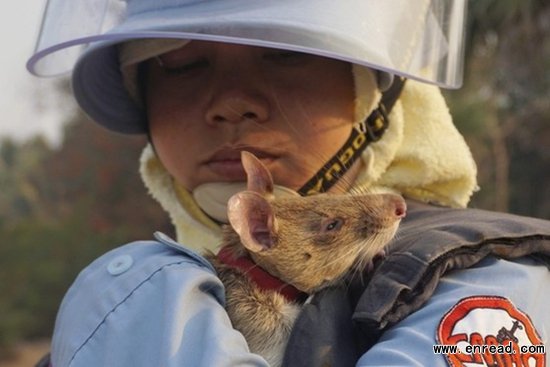It's been a busy morning for Cletus, Meynard, Victoria and others of their furry1 band. Tiny noses and long whiskers twitching2, they've scurried3 and sniffed4 their way across 775 square meters of fields to eliminate a scourge5 that has killed thousands of Cambodians: land mines.
克莱图斯、迈纳尔德、维多利亚等“鼠英雄”已经忙碌一早上了。它们的小鼻子使劲嗅着,长胡须随之抽动,一路疾扫了柬埔寨方圆775平方米的土地,目的是为铲除当地已夺走成千上万人性命的一大祸害——地雷。
Meet the Hero Rats: intelligent, surprisingly adorable creatures with some of the most sensitive noses in the animal kingdom. Sent from Africa, where they successfully cleared minefields in Mozambique and Angola, they began the same task in northwestern Cambodia early this month and have already scored
tangible6 results.
Two hectares have been declared mine-free around this village where more than 15 people have been killed or wounded by the explosives, forcing some to abandon their homes and rice fields and seek jobs elsewhere.
One villager, Khun Mao, says the rats have been
sniffing7 for suspected mines in a rice field he had been afraid to cultivate for years. He says that while it is too soon to say whether the
rodents8 can remove every mine, "To me, these rats are wonderful."
"The villagers have started to get excited about farming their land again. You can see the light in their faces," says Paul McCarthy, Cambodia program manager for the Belgian nonprofit organization APOPO, or Anti-Personnel Land Mines Detection Product in English.
Unlike standard mine
detectors9, the super-sniffers pick up only TNT and not other metal objects. And unlike wage-earning humans, the rats work for peanuts -- and their other favorite, bananas.
Theap Bunthourn, operations
coordinator10 for the 34-member team, cited other advantages of using rats: They are cheaper to acquire and train than mine-sniffing dogs and easier to transport.

 收听单词发音
收听单词发音 


